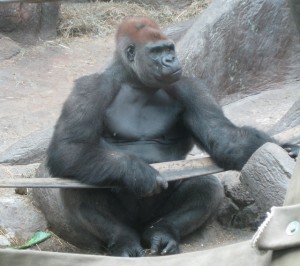What if there weren’t any other living great apes?
During my recent visit to the St. Louis Zoo, I wondered how it would have been had humans been the only species of great ape still alive on the planet.
I suspect that there would have been quite a few preachers out there suggesting that the animals represented by the fossils of other species of great apes were not at all similar to humans. I can imagine them preaching with great confidence that there wasn't any credible evidence that any other living animal was ever remotely similar to humans in physical appearance or facial expressions, regardless of the fossils.
 They would call it laughable to suggest that any other species of great ape was a tool user, or that any other species of great ape exhibited emotions akin to those displayed by humans. And they would have argued without any doubt that it was silly to suggest that communities of the other great apes would have ever exhibited such things as reconciliation, empathy and proto-morality.
They would call it laughable to suggest that any other species of great ape was a tool user, or that any other species of great ape exhibited emotions akin to those displayed by humans. And they would have argued without any doubt that it was silly to suggest that communities of the other great apes would have ever exhibited such things as reconciliation, empathy and proto-morality.
